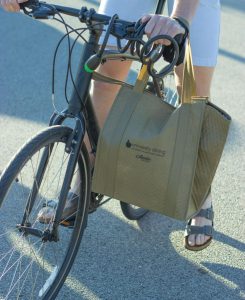UWO students secure ‘da bag’
October 14, 2020
Last week, students getting their food at Blackhawk Commons were met with a welcome surprise: An employee handing out new reusable bags for students to carry their food containers in.
Not only are the bags useful for students transporting their meals, but they also help address the sustainability issues that Blackhawk has faced during the semester.

During a traditional semester, Blackhawk does a good job keeping things sustainable by utilizing actual plates, silverware and cups, but the shift to completely serving food-to-go meant that none of these were available to use.
This semester, plates were replaced with reusable containers, silverware was replaced with plasticware and the reusable cups were replaced with single-use cups. While the reusable containers serve as a good replacement for the plates, the same cannot be said for the other substitutions.
In addition to the less-than-ideal substitutes, lids for the single-use cups were given to every student upon entry and plastic bags were available for students to place all their items in.
But now, one month into the semester, Blackhawk has made two welcome improvements: the distribution of reusable bags to students and not handing out lids with every container.
The introduction of these two changes marks a big improvement in trying to make Blackhawk more sustainable this semester while dealing with the restraints of COVID-19.
The improvement made by not handing out the single-use cup lids is self-explanatory: Not forcing kids to take the lids will result in less of them being wasted.

1. Sage Hall (First floor inside the parking lot entrance and third floor by the faculty offices.)
2. Clow Social Science Center (First floor, in front of the nursing faculty offices.)
3. Halsey Science Center (First floor by the biology office.)
4. Dempsey Hall (Second floor in front of administrative services.)
5. Polk Library (Inside the main entrance.)
6. Reeve Memorial Union (In front of the bookstore)
Plastic bag bins are also located in the lobbies of most dorm buildings on campus.
On the other hand, the addition of the reusable bags is the more important change of the two, as it addresses the issue of plastic bags — one of the biggest inconveniences to recycling efforts. Plastic bags have become a big issue in large part due to all of the misconceptions surrounding them.
While, yes, plastic bags can be recyclable, they are just not recyclable in your usual curbside bins. Plastic bags need to be recycled in a separate way than other common materials such as paper, glass, cans and hard plastics because they require different processing equipment to be properly reused.
Putting plastic bags in regular recycling bins can be harmful because plastic bags and films tend to get stuck in the machinery of processing plants.
If you do happen to have plastic bags, you can recycle them in bins found at the entrance to most grocery stores and supermarkets instead. On campus, you will find these bins in Polk Library, Reeve Memorial Union, the dorm buildings and many of the academic buildings around campus.
Another problem is the fact that most people don’t even make an attempt to recycle their plastic bags. According to Waste Management, only 1% of plastic bags are ever returned for recycling, meaning that the average family only recycles 15 out of the 1,500 plastic bags that they use annually.
This creates a whole host of problems, as plastic is a toxin that can stay in the environment for the 10 to 1,000 years that they can take to decompose. In that time, they clog sewer systems, harm wildlife and pollute the environment — especially oceans.
All the adverse effects that I have mentioned barely even scratch the surface of the issues, so I encourage you to read more on your own.
All that being said, I believe that, if students actually embrace and utilize these new bags, it could help reduce how much students have been relying on plastic bags to transport their food this semester.
Not only are the bags good for the university’s sustainability efforts though, but they are also beneficial for the students.
One of the biggest inconveniences, and one of the main reasons that students need bags in the first place, is that a lot of the food items offered do not fit in the provided containers. Fruit cups, dessert cups, milk cartons, prepackaged sandwiches and bananas all do not fit in the containers, especially when you already have other food in there.
The benefit that the new bag provides here is deceptively simple: more space. The size of the new bag allows students to take even more food (but probably still not enough to justify what they are paying for meal plans).
The other big benefit of these bags is the fact that they are insulated. The feeling of getting back to your dorm only to find out that your food feels like it’s been in the fridge for an hour is a heartbreaking feeling and an issue that will only become more prevalent in the coming winter months.
The insulation of the bag will prove itself handy in the future when you are inevitably forced to carry your food from Blackhawk to your dorm in intense Wisconsin snowfall.
While plastic bags unfortunately still remain available for students to use at Blackhawk, important steps have been made. That being said, it is still up to the students to use the resources that they have been given and make smart choices.













